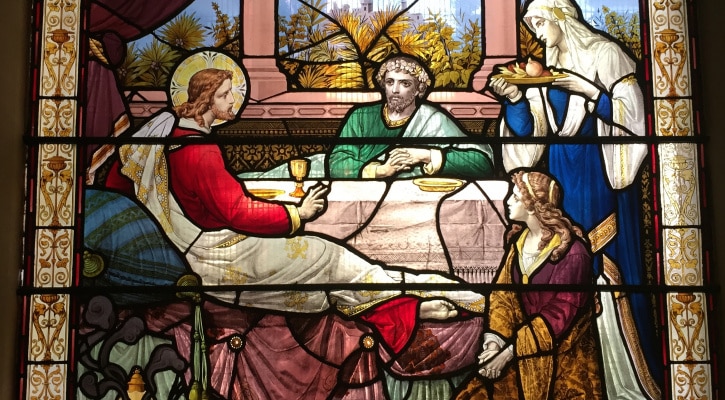The grace of hospitality
On Monday 29 July we celebrated as Church the memorial of Saints Martha, Mary and Lazarus. I love to call these three special people the trinity of hospitality. All of them, both singularly as well as communally, catered for Jesus’ need for frienship and support. They gave Jesus the loving warmth and friendship a healthy family can only give.
Obviously, when one delves deeper into this feast one notices a set of values which we really need them in our families and communities. Mary listened attentively to Jesus words. Martha offered Jesus the most wonderful hospitality you can imagine whereas Lazarus instantly went out from the tomb at Jesus’ command that humiliated death.
Saint Basil the Great opens our eyes and warns us against the most heinous temptation to close upon ourselves and, ironically, become that same despicable sepulcher from which Lazarus was liberated by Jesus. In one of his homilies this saint, also known as Saint Basil of Caesarea exhorts us:
Bear fruit like her and do not fall short of what mere inanimate matter can achieve. The earth bears crops not for her own benefit but for yours. You, on the other hand, when you give to the poor, are bearing fruit which you will gather in for yourself, since the reward for good deeds goes to those who perform them. Give to a hungry man, and what you give becomes yours, and indeed it returns to you with interest. Just as the wheat that falls on the ground falls there to the great profit of the one who sowed it, so the bread given to a hungry man will bring you great profit in the world to come. Let your husbandry be aimed at sowing this heavenly seed: as scripture says, Sow integrity for yourselves.
You are going to leave your money behind you here whether you want to or not. As for whatever share of glory you have received through your good works, that you can take with you to the Lord. All the people will stand round you in the presence of him who judges you all: they will acclaim you as one who feeds the hungry and gives to the poor, they will name you as a merciful benefactor...
Why do you think nothing of the future hopes that are stored up by those who despise the cares of the present time? Come, spread your wealth around, be generous, give splendidly to those who are in need. Then it will be said of you as it is in the psalms: He gave alms and helped the poor: his righteousness will endure for ever.
How grateful you should be to your own benefactor; how cheerful you should be at the honour he has conferred on you, that you do not have to make a nuisance of yourself at other people’s doors, but other people come and bother you at your own! But at the moment you are grumpy and no-one can get to you. You avoid meeting people in case you might be obliged to part with even a little of what you have. You can say only one thing: “I have nothing to give you. I am only a poor man.” Indeed you are poor and utterly destitute. Poor in love, poor in humanity, poor in faith in God, and destitute of any hope of eternal happiness.
In his Angelus address of July 17, 2016, Pope Francis gives us an excellent cathecesis of what true hospitality is all about, namely the capacity to listen. He tells us:
Understood in this light, hospitality, which is one of the works of mercy, is revealed as a truly human and Christian virtue, a virtue which in today’s world is at risk of being overlooked. In fact, nursing homes and hospices are multiplying, but true hospitality is not always practised in these environments. Various institutions are opened to care for many types of disease, of loneliness, of marginalization, but opportunities are decreasing for those who are foreign, marginalized, excluded, from finding someone ready to listen to them: because they are foreigners, refugees, migrants. Listen to that painful story. Even in one’s own home, among one’s own family members, it might be easier to find services and care of various kinds rather than listening and welcome. Today we are so taken, by excitement, by countless problems — some of which are not important — that we lack the capacity to listen. We are constantly busy and thus we have no time to listen. I would like to ask you, to pose a question to you, each one answer in your own heart: do you, husband, take time to listen to your wife? And do you, woman, take time to listen to your husband? Do you, parents, take time, time to “waste”, to listen to your children? or your grandparents, the elderly? — “But grandparents always say the same things, they are boring…” — But they need to be listened to! Listen. I ask that you learn to listen and to devote more of your time. The root of peace lies in the capacity to listen.
Loving God, give us hearts that listen for your word.
Let us imitate the Good Samaritan, who does not turn away from suffering.
Help us listen.
May we listen to those who struggle daily for dignity.
Let us hear your voice in the stories of those on the margins.
Help us always see what binds us together as sisters and brothers.
Help us to heal.
May we be willing to stand in the place of others.
Let us be open to difference that we may arrive at understanding.
Help us to seek reconciliation that our world may reflect justice.
Help us respond.
May our faith move us to action in the public square.
Let us work with others of good will, finding solutions together.
Help us exercise political charity, seeking the common good and dignity for all.
Lord, give us the courage to trust in your hand guiding us.
Give us the courage to respond like the Good Samaritan, setting aside divisions to attend to the needs of the other. May we know and see your love present in our communities, made real in the ways we love one another.
Amen.
Fr Mario Attard OFM Cap





